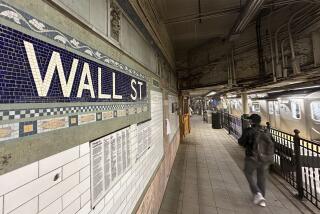Dow Slumps 14.09 in Late Selloff : Analysts Blame Fall on Technical Factors, Inflation Fears
- Share via
NEW YORK — Stock prices closed broadly lower on Wednesday, abandoning a feeble late-afternoon rally attempt as buyers faded to the sidelines for the second straight day.
The Dow Jones industrial index, which had been up about 5 points with an hour to go, dropped to 14.09 lower at the close to 1,985.41.
It was the second straight day in which the market yielded to late selling. On Tuesday, the Dow lost 8.62 points after a 30-point rally collapsed in the last hour of trading.
Declining issues outnumbered advances by more than 2 to 1 in the daily tally of New York Stock Exchange-listed activity.
Big Board volume came to 147.59 million shares, against 161.91 million in the previous session. The NYSE’s composite index fell 1.04 to 145.13.
“It’s been a drifting kind of a day with a lack of players--no buyers. There’s nothing to bring in investors,” said Larry Wachtel of Prudential-Bache Securities.
Analysts said stock prices were weakened by technical factors within the market and renewed inflation worries after the Labor Department reported that the consumer price index rose 0.5% in March. That marked the biggest monthly increase in the inflation gauge since it jumped 0.7% in January, 1987.
Analysts said there was a general sense of relief on Wall Street that the figure wasn’t worse.
Rumors and conjecture that the increase might run close to a full percentage point sent both stock and bond prices lower in late trading on Tuesday.
“Buyers on Strike”
But even though that talk proved unwarranted, brokers said the news left investors in a wary mood about prospects for possible credit-tightening by the Federal Reserve.
“We’re going to continue with a market like this until we get a technical bounce,” Wachtel said. “Right now, the buyers are on strike.”
Despite a slight improvement in bond prices, interest rates remained too high to make stock market investors happy, since the high yields paid on bonds are attracting investors away from equities.
“With the long bond yield over 9%, bonds are a major bearish factor in the stock market,” said Jerome Hinkle, trading co-manager at Sanford C. Bernstein & Co., adding that program trading was another factor weighing prices down.
“In quiet markets, people tend to go for the high yields,” a dealer at a European bank said.
Midland Montagu Securities commented, “inflation remains the dominant concern,” and predicted that it would grow at a more rapid pace over the second half of the year.
Several big-name stocks failed to muster much favorable response to positive earnings news.
American Telephone & Telegraph was unchanged at 26 1/2. The company reported a higher first-quarter profit and said it was aiming to sustain earnings growth at a 15% rate for the remainder of the year.
Blue Chip Losers
Dow Chemical dropped 3/8 to 84 3/8 despite the company’s report that first-quarter earnings climbed to $2.67 a share from $1.28 in the comparable period last year.
Other losers among the blue chips included International Paper, down 1 3/8 at 42 5/8; Aluminum Co. of America, down 1 1/8 at 45 3/8, and Eastman Kodak, down 3/8 at 40 after hitting a new 52-week low of 39 1/8.
Columbia Gas System fell 1 to 28 7/8 in active trading. The company cut its quarterly dividend to 50 cents a share from 79.5 cents.
On the Tokyo Stock Exchange, the Nikkei Stock 225-share index gained 207.09 points to end the day at 26,864.09.
“The setback during the past three trading days made share prices reasonable for investors,” said an official of a major securities company, who demanded anonymity.
The Nikkei index lost 454.35 points between last Friday and Tuesday.
In London, stock prices slipped in late trading after the United States reported a rise in inflation last month. The Financial Times 100-share index closed 12.1 points lower at 1,786.8.
More to Read
Inside the business of entertainment
The Wide Shot brings you news, analysis and insights on everything from streaming wars to production — and what it all means for the future.
You may occasionally receive promotional content from the Los Angeles Times.









